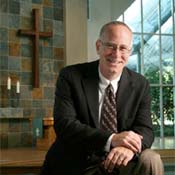 Glen Peterson is founder and President of the Capacity Partnership Group. He consults with non-profit organizations on matters of leadership and moral governance, and has abundant experience in developing community-based partnerships that serve the poor and the needy.
Glen Peterson is founder and President of the Capacity Partnership Group. He consults with non-profit organizations on matters of leadership and moral governance, and has abundant experience in developing community-based partnerships that serve the poor and the needy.
There may be no "Christian Position" on immigration, legal or illegal, but there are principles that will inform our discussion and shape our conclusions about immigrants as human beings, about fairness, and about God's work among us. The issues are nuanced and complex and require the serious attention of Christians who seek to act justly, love mercy, and walk humbly before God.
In the Christian and Jewish narrative of creation, God makes humans in his own image. Immigration cannot be discussed and debated only in the abstract, as it is ultimately about individual people, created in God's image, who are immigrants. Each of these immigrants has value to God and to people who value what God has created. Christian attitudes and actions toward immigrants, informed by our belief in a common creation and our possession of God's image, will inform the way we treat all people, immigrant or not.
This possession of God's image also applies to the self-understanding of the immigrant. Some immigrants think of themselves as inferior to the majority culture in which they live because they may come from a place of economic or educational impoverishment. Immigrants who understand their own intrinsic value become better educated and participate more fully in the economic and cultural life of their new home.
Economic systems pull inexpensive labor from countries south of our international border when there is a need. Related economic forces push laborers northward in search of ways to provide food and shelter for their families and children. Economic forces also push labor away when there is less demand during economic shifts that create fewer jobs. Christians know about God's interest in economic fairness for workers from James 5. Workers deserve fair treatment and payment for their work. Fair employers and just legal systems will not treat certain individuals differently for arbitrary reasons.
Economic forces over the past fifteen years have attracted nearly half a million people per year that the legal system has not been able to accommodate. The Department of Homeland Security estimates that there are 10.8 million laborers in the United States who live outside of the current immigration law and are therefore undocumented. It is un-Christian to allow people to live in a system that allows some workers to have fewer human and civil rights than others. The current system allows for human traffickers, unscrupulous employers, and other criminals to prey upon the vulnerable immigrant labor force that has built riches for others. Immigration reform that is fair and just to the vulnerable workers is an ethical issue for Christians. Leaving the broken immigration as it is only offers amnesty to human traffickers, smugglers, and unscrupulous employers who take advantage of migrants.
Jesus calls Christians to love across the social constructs that divide us. Men and women who want to follow the example of Christ will look for ways to help, to improve the lives of those who have less than us.
 Mark D. Roberts is a widely read and widely respected author, speaker, blogger (here), and Senior Director of Laity Lodge.
Mark D. Roberts is a widely read and widely respected author, speaker, blogger (here), and Senior Director of Laity Lodge.
The Bible provides principles for Christians who are considering the issue of immigration (including illegal immigration, which will be the focus of my comments here). Though these principles may, in the end, lead to a "Christian position" on illegal immigration, they do not do so unanimously or simplistically. Christians who believe that the issue of illegal immigration has an easy answer -- no matter what answer they prefer -- are not paying attention to the diversity of the biblical witness. I will mention four basic biblical principles that pull us in different directions at once:
1. Christians are called to welcome all people into our communities of faith. This includes persons of all races, ethnicities, and nationalities. It includes undocumented workers and the business owners who employ them, lawmakers who pass laws to limit illegal immigration and those who protest such laws. The church is to be a place of refuge for all sinners, a place of welcome for all people.
2. The United States of America is neither a church nor a Christian nation in the sense that it is to fulfill the calling of the church of Jesus Christ. The values, priorities, and activities of the country may rightly differ from those of the church and the individual Christian. If someone steals my car, as a Christian, I am called to forgive that person. The government's job is not to forgive, but rather to arrest, prosecute, and incarcerate that person.
3. Christians are instructed in Scripture to honor government authority and to support even its use of "the sword" in the exercise of its governing responsibility. Yes, there are times when Christian loyalty to God trumps loyalty to Caesar. But, in general, Christians are to be subject to governing authorities as we obey and uphold the laws of the nation (e.g., Rom. 13:1-7).
4. God's people, including Christians, are to be committed to justice, especially for those who are powerless in society, including "aliens"(Ex. 22:21-24; Lev. 19:33-34). The call of God to do justice is not limited by national borders. Christians must be profoundly committed not only to our own personal flourishing and that of our fellow citizens, but also to the well-being of our neighbors in other countries. Christians can never be satisfied with economic prosperity in the United States when so many of our neighbors to the south are caught in poverty.
If these four principles apply, then no Christian answer to the illegal immigration problem in the United States will be an easy or simplistic one. We need a serious, biblically-informed, mutually-respectful conversation among Christians of varying viewpoints as we seek to determine God's guidance for our churches and our nation.
I know from experience that the vast majority of those who come to the United States illegally do so because they were trapped in poverty and injustice in their native countries and had no hope of improving their lives for themselves and their children. Christians throughout the Americas should be working in diverse ways to help those south of the U.S. border to have the opportunity to escape from poverty and oppression in their own homelands, even as our nation finds wise ways, in the words of Emma Lazarus in "The New Colossus," to welcome into our country "your tired, your poor, your huddled masses yearning to breathe free, the wretched refuse of your teeming shore."




